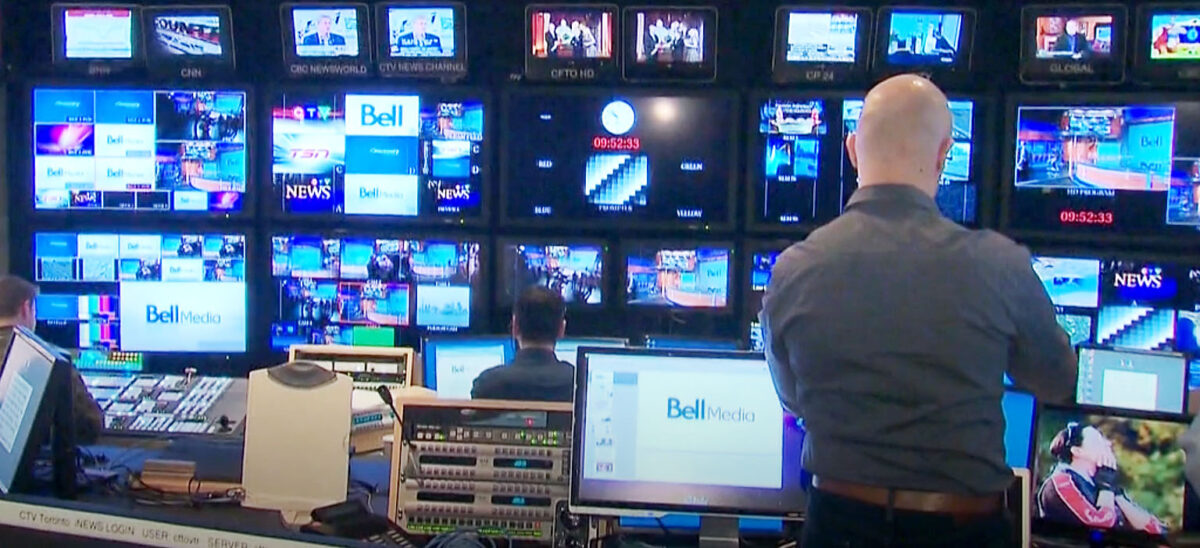
By Barry Rueger
Bell Canada is set to axe 4,800 jobs, sell dozens of radio stations, cut newsrooms across Canada, and destroy CTV’s star investigative program W5.
The announcement by BCE Inc. made big news-but the real damage was done decades ago.
Canadian news has long been an expanding wasteland.
What saddens me is that government could have prevented this–and still has the power to fix it.
Don’t be fooled by Bell’s announcement. None of this is about radio and TV stations losing money. It’s about them not making big enough profits for BCE, Canada’s largest communications company.
Bell is a giant in the businesses of broadband wireless, Internet, TV, media and business communications services. It regards the newsrooms that it’s closing as nothing more than “content-providers,” interchangeable with blogs or YouTube channels.
On Feb. 8 BCE Inc. reported its best financial results in two years, all of its 2023 financial guidance targets were achieved, and announced that it is “undertaking largest workforce restructuring initiative in nearly 30 years, reducing approximately 4,800 positions, or 9% of all BCE employees in 2024, and driving in-year cost savings of $150 million to $200 million; 250 million annualized.” — BCE news release
I recall a time when owning a radio station or a newspaper was considered a great privilege, and one that came with great expectations. In that pre-Internet era the government of Canada believed that a healthy and responsible media landscape was essential to the well-being of our country.
I first broke into radio in the 1980s. At the time, holding a broadcast licence was special, and the task of handing out those licences was managed by the Canadian Radio-television and Telecommunications Commission, the CRTC.
Radio and TV station owners were required to attend the semi-annual CRTC licence renewal hearing. In town halls and hotel ballrooms, a table full of CRTC Commissioners would face off against tables full of station owners, lawyers, and interested parties. The process was adversarial to a degree, and it allowed the CRTC to manage how broadcast media was operated.
CRTC ensured local journalism
The commission examined the entire programming schedule of an applicant’s operation, the finances underlying their business, and took a special interest in one thing: News.
I remember sitting in hearings where broadcast owners tried to argue that their hourly newscasts could be reduced to thirty seconds. And I recall the look of incredulity on the CRTC Commissioners’ faces when they heard these claims.
The CRTC in that age understood what Canada’s elected officials seem to no longer believe: a healthy society needs a healthy news ecosystem to remain strong.
That means locally-owned media outlets, and locally-written and presented news.
There was a time when both of these were considered to be the bedrock on which our broadcast industry rested.
Sadly, federal protections of news were dismantled, one by one, as Brian Mulroney became Prime Minister, and Conrad Black became a press baron.
Radio and TV stations were allowed to merge into larger and larger corporate groups. They were also allowed to reduce news coverage, share news between whole networks, and almost entirely eliminate news departments.
As radio stations stopped delivering local news, Black was emptying out newsrooms at the papers he owned across Canada.
Broadcasters and publishers had entered the era when media was no longer about journalism, but about maximizing profits.
To be clear, these cuts began before the Internet had become the monster it is today.
Everyone likes to point fingers at Facebook and Google. But long before they appeared, the Hamilton Spectator had a sea of empty blue carpet tiles where half of its newsroom had been. Those early cuts at the Spectator, like the ones happening today at Bell radio stations, weren’t about competing with on-line entities. They were about cutting every cost to the bone, to line the pockets of owners.
Now, in large parts of Canada – I live on the South Shore of Nova Scotia – a daily local paper is a thing of the past, and “national” publications like the Globe and Mail have exited the market as well. Although there are small on-line-only news operations for city dwellers – like the Halifax Examiner – and the print and on-line Lighthouse Now, in Bridgewater – much of rural Canada has relied on Facebook as its primary news source.
FaceBooks Bans News in Canada
When Facebook banned Canadian news from its site last year, the only local news available was on local radio.
Now Bell plans to take away even that tiny smattering of journalism in towns across Canada.
“This is the erosion not just of journalism, of quality local journalism at a time where people need it more than ever, given misinformation and disinformation” – Justin Trudeau
This wasteland can still be rebuilt.
The government could still require broadcasters to have proper local news teams.
Funding for small, local newspapers could be increased dramatically, for a fraction of the amount spent to entice auto manufacturers to Canada or to subsidize oil and gas production.
But successive Canadian governments have shown they no longer view a healthy and combative news media as a priority.
Whether it’s because of their love of unfettered capitalism, or because fewer media eyes means fewer political headaches, decisions were made that are destroying Canadian journalism.
“Garbage decision”
Prime Minister Justin Trudeau called Bell’s job cuts a “garbage decision” at a press conference in Toronto. “This is the erosion not just of journalism, of quality local journalism at a time where people need it more than ever, given misinformation and disinformation … It’s eroding our very democracy, our abilities to tell stories to each other,” he said.
Yet he also said, “Canadians need to demand better, as we will be demanding better from corporate leaders like in this case, Bell, that are eroding Canadians’ ability to know each other, to trust each other, and to trust in the country and the future we are building together.”
The prime minister seems to be saying that government can only do so much, and that it’s up to Canadians to “demand better” of Bell, and corporations.
No. It’s up to Trudeau and his government to “demand better.” That’s their job.
Despite what Trudeau may say, our government has great latitude, and great power, to restore local journalism.
Today’s politicians seem to fear the media and critics of media more than ever. But the fact is they have, if they choose to use them, measures that would leave every town and city with a healthy, responsible, and professional news media. Canada can, if the government chooses, again have news media in which corporate profits come with a responsibility to serve the communities in which they operate.
I’m asking our Canadian government to step up to the plate.
Don’t let Bell sell off these radio stations. Sit Bell down, as the CRTC used to do, and demand that they restore proper newsrooms and hire real Canadian journalists to staff them.
If they refuse, take away their broadcast licences.
~~~
 Barry Rueger is a writer with ties to Canada, France, and Appalachia. Follow Barry’s work at appalbarry.com.
Barry Rueger is a writer with ties to Canada, France, and Appalachia. Follow Barry’s work at appalbarry.com.
Canadian Journalist.ca is an independent journalist run organization . Help support independent journalism in Canada.
Put a few dollars in our Tip Jar via PayPal or cards.

